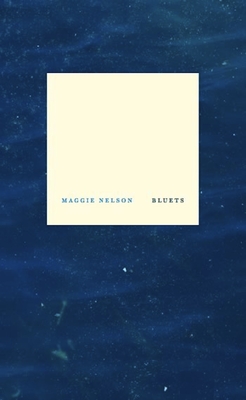Bluets (Paperback)

Staff Reviews
A little late to this party I nevertheless feel Nelson's blue, its radiance. And yes, a little of blueness too. "In which case blue [of the sky] is something of an ecstatic accident produced by void and fire."
— Doug
Is Bluets poetry? Is it memoir? Some have shelved it as fiction, which it most certainly is not. No matter what you call it, Nelson's language is precise like poetry, startling like memoir, and captivating like fiction. A book I recommend again and again.
— Rachel
Suppose I were to begin by saying that I had fallen in love with a book. That book would be quick, lovely, and deeply intelligent. It would be sad but sexy, researched, but not dry. It would be wet -- like tears, like medicine, like libido.
— Sarah G.
There's a way in which Nelson's "Bluets" is bereft meditation on not just the color blue, but the things we love. What makes us feel the way we do, and why? And more importantly: does it matter, the reason? Bluets is a complex dive into the wide blue ocean from a very high diving board. The judges are not looking -- you are -- and if you're optimistic, their eyes have nothing to do with the grace of this beautiful book's descent.
— Maggie
And what exactly does it mean to "pour yourself onto the page?" Maggie Nelson takes to the pen, no, to the ink, blue ink. She pours herself into each word, into each letter; all of them, Maggie Nelson.
— Nicolas
Would that I could quote the whole thing. That's the best way to sell you on Maggie Nelson’s "Bluets." I can describe it: "Bluets" is a book of prose-poetry consisting of 240 meditations/aphorisms on the color blue, which is used (blue is) as a metaphor and symbol for deep, implacable heartbreak. It is the story of a heartbreak (a breakup) and other sadnesses (an illness); of ecstatic grief, manic mourning, stillborn love, and little deaths. What restraint. More: "Bluets" is the book I’ve gifted most, witnessed gifted most, and suggested as a gift most. I'd be glad to receive it always.
— FionaDescription
Suppose I were to begin by saying that I had fallen in love with a color . . .
A lyrical, philosophical, and often explicit exploration of personal suffering and the limitations of vision and love, as refracted through the color blue. With Bluets, Maggie Nelson has entered the pantheon of brilliant lyric essayists.
Maggie Nelson is the author of numerous books of poetry and nonfiction, including Something Bright, Then Holes (Soft Skull Press, 2007) and Women, the New York School, and Other True Abstractions (University of Iowa Press, 2007). She lives in Los Angeles and teaches at the California Institute of the Arts.
About the Author
Maggie Nelson is the author of several books of poetry and nonfiction, including Something Bright, Then Holes (Soft Skull Press, 2007) and Women, the New York School, and Other True Abstractions (University of Iowa Press, 2007). She has taught writing and literature at The New School, Wesleyan University, and Pratt Institute of Art, though currently teaches at CalArts.

